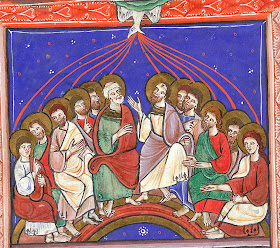▼
Sunday, 8 June 2014
'Com, Shuppere, Holy Gost'
Com, Shuppere, Holy Gost, ofsech oure thouhtes;
Ful wyth grace of hevene heortes that thou wrouhtest.
Thou, that art cleped forspekere and gyft from God ysend,
Welle of lyf, fur, charite, and gostlych oynement,
Thou gyfst the sevene gyftes, thou finger of Godes honde,
Thou makest tonge of fleshe speke leodene of uche londe.
Tend lyht in oure wyttes, in oure heortes love,
Ther oure body is leothewok gyf strengthe from above.
Shyld ous from the feonde, and gyf ous gryth anon,
That we wyten ous from sunne thorou the lodesmon.
Of the Fader and the Sone thou gyf ous knoulechinge,
To leve that of bothe thou ever be lovinge.
Wele to the Fader and to the Sone, that from deth aros,
And also to the Holy Gost ay be worshipe and los.
This is a translation of Veni, Creator Spiritus by the Franciscan William Herebert (d.1333). I posted it some years ago here along with some other translations of the hymn, but I thought I'd give it its own post today. It could be rendered thus:
Come, Creator, Holy Ghost, search our thoughts;
Fill with grace of heaven the hearts which thou hast wrought.
Thou who art called For-speaker and gift from God sent,
Well of life, fire, charity, and spiritual ointment,
Thou givest the seven gifts, thou finger of God's hand,
Thou makest tongues of flesh speak languages of every land.
Kindle light in our wits, in our hearts love,
Where our body is weak, give strength from above.
Shield us from the fiend, and give us peace anon,
That we may keep ourselves from sin through the Guardian.
Of the Father and the Son give us knowledge,
To believe that thou ever art of both praising.
Glory to the Father and to the Son, who from death arose,
And to the Holy Ghost also be ever worship and praise.
One of the pleasures of reading Herebert's translations is how familiar the vocabulary is; that's one of the reasons I like blogging about them, because to me they give a clearer sense than almost any other texts of the line of continuity in English religious writing beginning in the Anglo-Saxon period, and running in some ways up to the present day. There's only a few words here which present any difficulties to a speaker of Modern English: the occasional rare word like leothewok (which means 'pliant in body, weak') and words now obsolete like leodene 'languages', gryth 'peace', los 'praise'. Otherwise there's the odd poetic touch like lodesmon, which is translating Latin ductore and means 'leader, guardian' but also 'steersman, pilot of a ship', and Shuppere, 'Creator' - descended from one of the first words many people learn when studying Old English, 'scyppend'. There's actually an Old English gloss of this hymn which begins Cum, þu scyppend gast - not very different from Herebert.
In fact Herebert, writing seven centuries ago, seems hardly less far away than the world in which this version of the hymn was recorded:


Ancient words. Heavenly music. Who could ask for anything more.
ReplyDelete